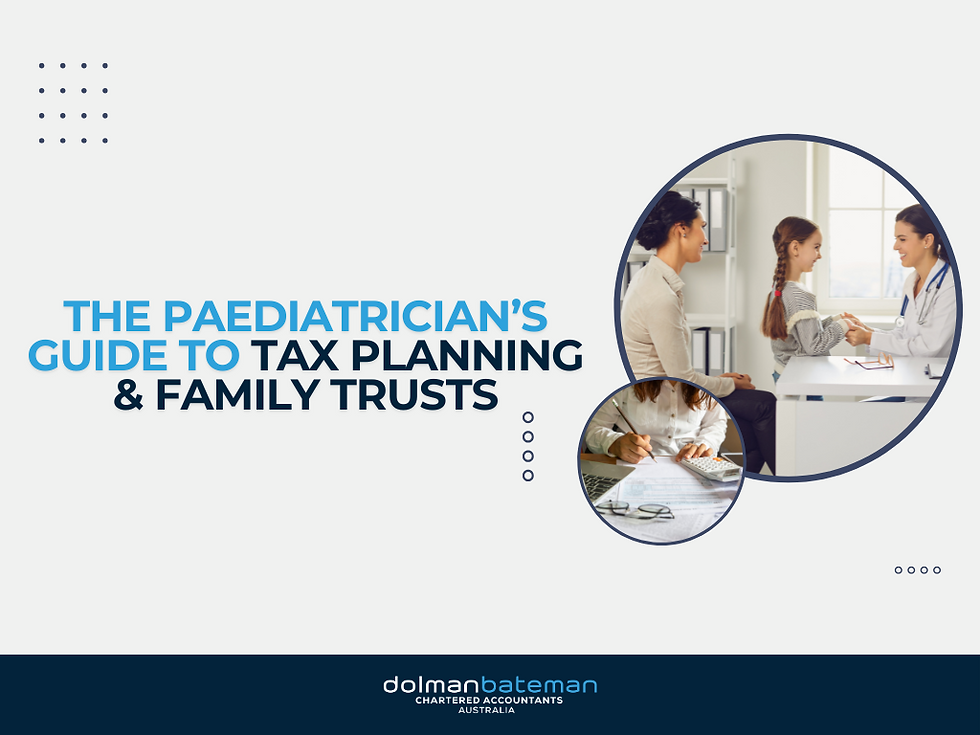The Key Role of an Accountant in Setting Up and Managing Your Medical Service Trust
- Arnold Shields

- Mar 31, 2023
- 3 min read
Updated: May 16, 2025

Medical Service Trusts (MSTs) have become a preferred structure for doctors and medical professionals in Australia. More than just a tax strategy, MSTs provide a flexible and protective framework for managing healthcare practices while legally reducing tax liabilities.
What Is a Medical Service Trust?
An MST is a legal structure commonly used by medical practitioners to engage support staff and administrative services while allowing their private billing income to remain outside the trust. The trust charges a service fee to the doctor for providing non-medical services (admin, premises, staff). This creates a legally separate income stream that can be distributed to beneficiaries, offering potential tax savings and asset protection.
Top Benefits of a Medical Service Trust
1. Income Splitting for Tax Efficiency
A standout advantage of MSTs is income distribution. The trustee can distribute income to beneficiaries (e.g. spouses or adult children) who may be in lower tax brackets. This allows the medical practitioner to legally reduce overall tax paid on business income.
💡 Important: Income distribution must align with ATO rules. Professional tax advice is essential to remain compliant and avoid penalties.
2. Asset Protection
Assets owned by the trust are generally shielded from personal liability or legal action against the practitioner. If the doctor is sued or becomes bankrupt, the trust assets remain protected—because they are owned by the trust, not the individual.
Choosing the Right Trust Structure
There’s no one-size-fits-all. Choosing the right trust depends on your practice structure:
🔹 Discretionary Trust (Best for Solo Practitioners)
Offers flexibility. The trustee decides who gets what, which is ideal for tax planning.
🔹 Unit Trust (Ideal for Group Practices)
Each doctor owns fixed “units” in the trust, meaning income is distributed according to their share. Less flexible but clear for shared ownership.
How an Accountant Can Help You Maximise MST Benefits
A specialised accountant does more than just tax returns. Here’s how they help manage your MST effectively:
✅ Trust Set-Up
Ensure your trust deed and structure meet ATO and legal requirements from the start.
✅ Tax Compliance
From preparing trust tax returns to managing ATO deadlines, your accountant keeps everything compliant and current.
✅ Financial Management
Assistance with cash flow planning, budgeting, and financial reporting to make sure your practice runs smoothly.
✅ Trustee Guidance
Trustees have legal duties. Your accountant will help ensure these are fulfilled to avoid liability or audit risk.
✅ Strategic Income Distribution
Your accountant can advise on how to distribute trust income efficiently to minimise tax within ATO regulations.
✅ Personal Asset Protection
By using the trust wisely, your accountant can help separate personal and professional risk.
Final Thoughts
Medical Service Trusts are not a tax loophole, they're a smart structure for modern medical practices. When set up and managed correctly, they provide doctors with tax flexibility, legal protection, and business stability. But it’s essential to work with an accountant experienced in healthcare structures to ensure compliance and long-term benefit.
Need expert help with setting up or managing your MST?
Get in touch with Dolman Bateman, Australia’s leading accounting firm for medical professionals.
Disclaimer:
The information provided in this article is general in nature and does not constitute personal financial, legal or tax advice. While every effort has been made to ensure the accuracy of this content at the time of publication, tax laws and regulations may change, and individual circumstances vary. Dolman Bateman accepts no responsibility or liability for any loss or damage incurred as a result of acting on or relying upon any of the information contained herein. You should seek professional advice tailored to your specific situation before making any financial or tax decision.



